- Category
- Life in Ukraine
How Ukrainians Are Preparing for Winter Amid Russian War on Energy Infrastructure
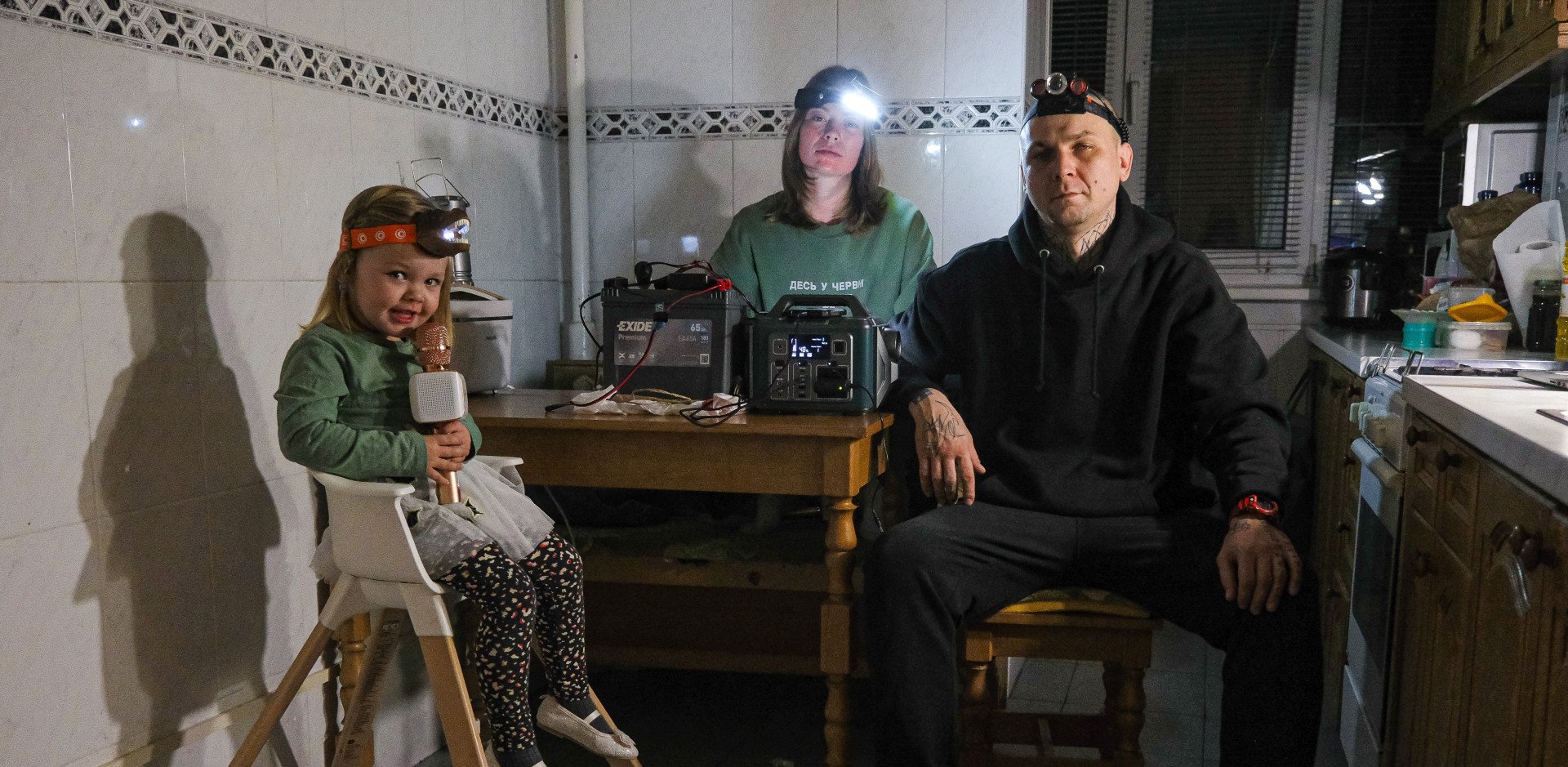
“When the power is on, and we can use the projector to watch a movie, it brings a lot of joy,” says Serhii Surepin from Kyiv, as he prepares for another brutal winter. Russia’s attacks have shattered Ukraine’s energy infrastructure, turning power outages into a harsh new reality. Like countless Ukrainians, Serhii is finding ways to endure the cold and darkness, making even the smallest comforts feel like triumphs.
While elderly people struggle to navigate high-rise buildings without elevators, families often face difficulty preparing fresh meals for their children. People are trying to adapt to the new realities with the help of various autonomous energy-generating devices.
Before the Russian full-scale invasion, Ukraine had a power generation capacity of 37 GW from its key energy sources: hydroelectric, coal, and nuclear, with the latter making up 55% of the country’s energy generation. Ukraine was entirely energy self-sufficient, providing affordable electricity to its 40 million citizens.
However, this situation has drastically changed over the past three years, as Russian forces have systematically targeted Ukraine’s energy infrastructure. “About half of Ukraine’s power generation capacity has either been occupied by Russian forces, destroyed, or damaged,” the International Energy Agency said, “Approximately half of the large network substations have been hit by missiles and drones.”
Russia launched one of its largest aerial attacks on August 26, 2024, firing more than 200 missiles and drones, the majority of which targeted Ukraine’s energy infrastructure.
As winter approaches and temperatures drop, power consumption will rise steadily. The reality of rolling blackouts and extended outages is already apparent, as Ukrainians experience frequent power cuts. Cities are operating on scheduled blackouts, but the situation may worsen—further challenging daily life.
In response, Ukrainians are preparing for the worst. Across the country, people are stockpiling portable batteries, alternative heating sources, and warm clothing, fully aware that they may need to rely on alternative methods to stay warm and stay connected.
Despite ongoing repair efforts, the strain on Ukraine’s energy infrastructure remains significant. The country now faces a critical challenge: keeping homes heated and ensuring that essential services continue to function during the harsh winter months, all with limited resources.
Businesses, especially restaurants, will face an increasing demand to provide warmth, charge devices, and maintain their services, all while operating on a limited power supply—often relying on diesel-powered generators at their own expense.
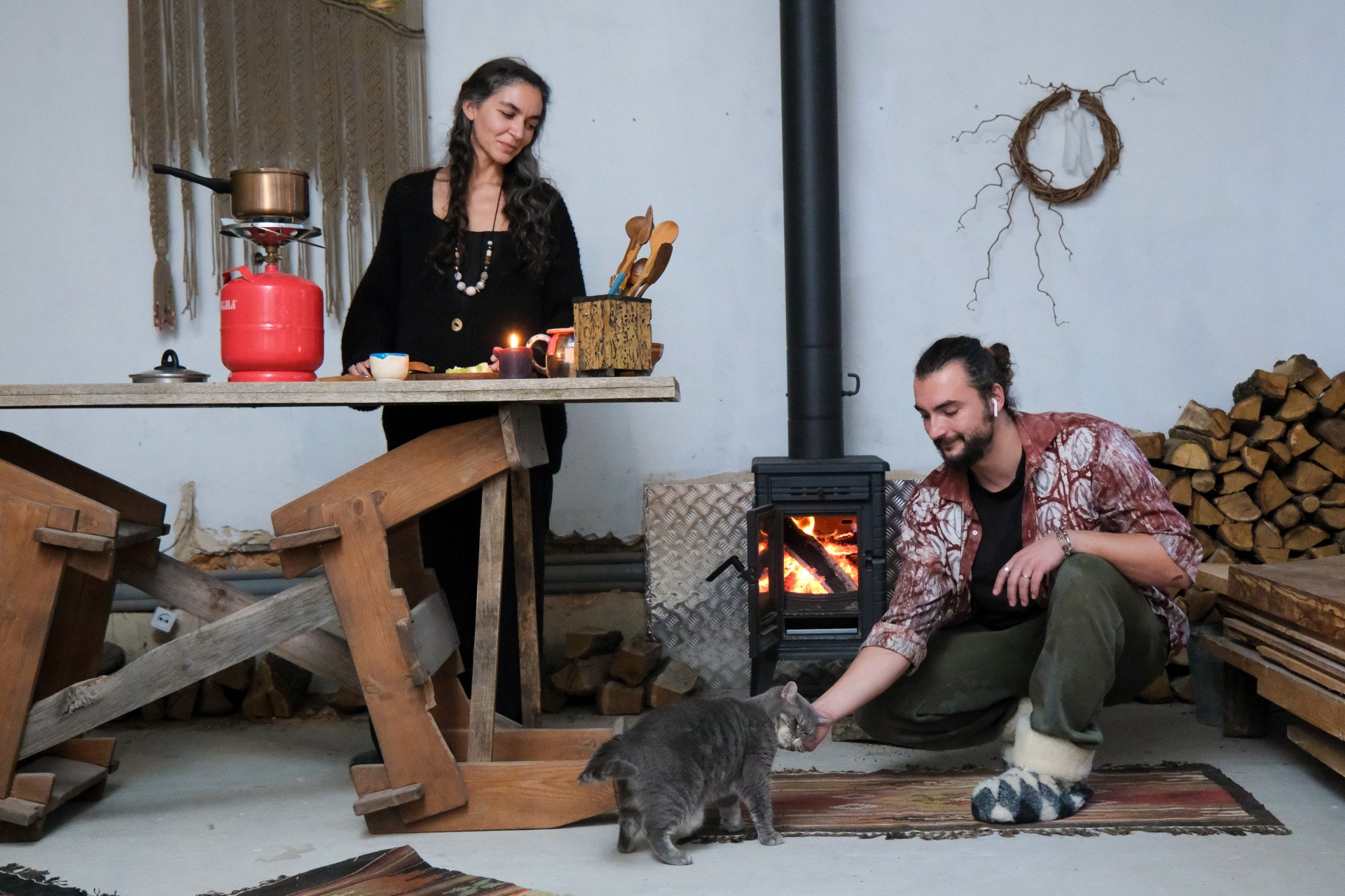
Serhii and Oleksandra
Oleksandra Burbela, 35, and her husband, Serhii, 33 began preparing for a harsh winter in the summer of 2022, after experiencing the disruptions caused by the war. “For my family, the start of the full-scale invasion didn’t mean ‘everything will end in three days,’” Oleksandra recalls.
As artists and artisans, they adapted to the challenging conditions, promoting Ukrainian contemporary decorative-applied arts through “Maysternya Home,” a space that unites artisans, supports the army with donations, and connects Ukrainians and foreigners to their culture.
As blackouts became more frequent in October and November 2022, Oleksandra and Serhiy opened their first charity art exhibition at Maysternya Home. They set up 130 artworks using flashlights, with temperatures as low as 13–15°C, and held the opening by candlelight on a generator. “Despite the blackouts, lack of mobile signal, and the cold, about 100 people came,” Oleksandra says. “That was inspiring.”
During the winter, they installed an additional cast-iron stove, used candles, and cooked with portable gas cylinders to manage the power shortages. We decided that the experience of houses in the Carpathians would come in handy—if people there manage with firewood in the mountains, then we’ll survive in the city too.”
This winter, they are preparing for a more sustainable solution by investing in a power inverter, balancing their earth-based approach with the need for modern, reliable energy. “The inverter will complement our hands-on methods, ensuring we’re more efficient and less reliant on noisy, polluting generators,” Oleksandra explains.

Serhii Surepin
Serhii Surepin, 30, a Kyiv native and volunteer worker is prepared to sit the winter out in his home, having stocked it with essentials from Ukraine’s big-box stores. Among his supplies are a 1200 KW Ecoflow accumulator, plenty of candles, gas canisters for cooking, and ample provisions to stay warm. With concerns over high electricity demand and limited supply, there’s speculation that many homes across Ukraine may face inadequate heating this winter.
“This year, a harsh winter is expected—not only because of the severe weather but also due to ongoing attacks from Russia,” Serhii explains. “These attacks could significantly impact infrastructure, leading to power, heating, gas, and water outages. In response, we’ve had to purchase several power stations, a gas burner for cooking, freeze-dried food, and stock up on water.” As infrastructure becomes increasingly strained, Ukrainians like Serhii are taking proactive steps to ensure their homes are prepared for the worst.
The constant lack of electricity has instilled a new discipline in Serhii and his family. “The constant lack of electricity has made us more mindful of keeping all devices charged,” he says. “Whenever power is available, everything goes on charge immediately. This has become a new habit and a source of discipline.” The ongoing power outages have pushed many to adapt, finding new routines and methods to stay prepared for any emergency.
Despite the hardships, Serhii remains optimistic. “Even in tough times, I believe it’s important to find something positive. It’s clear that a way out can be found in any challenging situation. I’ve realized that living comfortably doesn’t require much. Small things, like when the power is on and we can use the projector to watch a movie, bring a lot of joy.” His reflections embody the resilience and resourcefulness that have become vital traits for many Ukrainians facing this difficult winter.
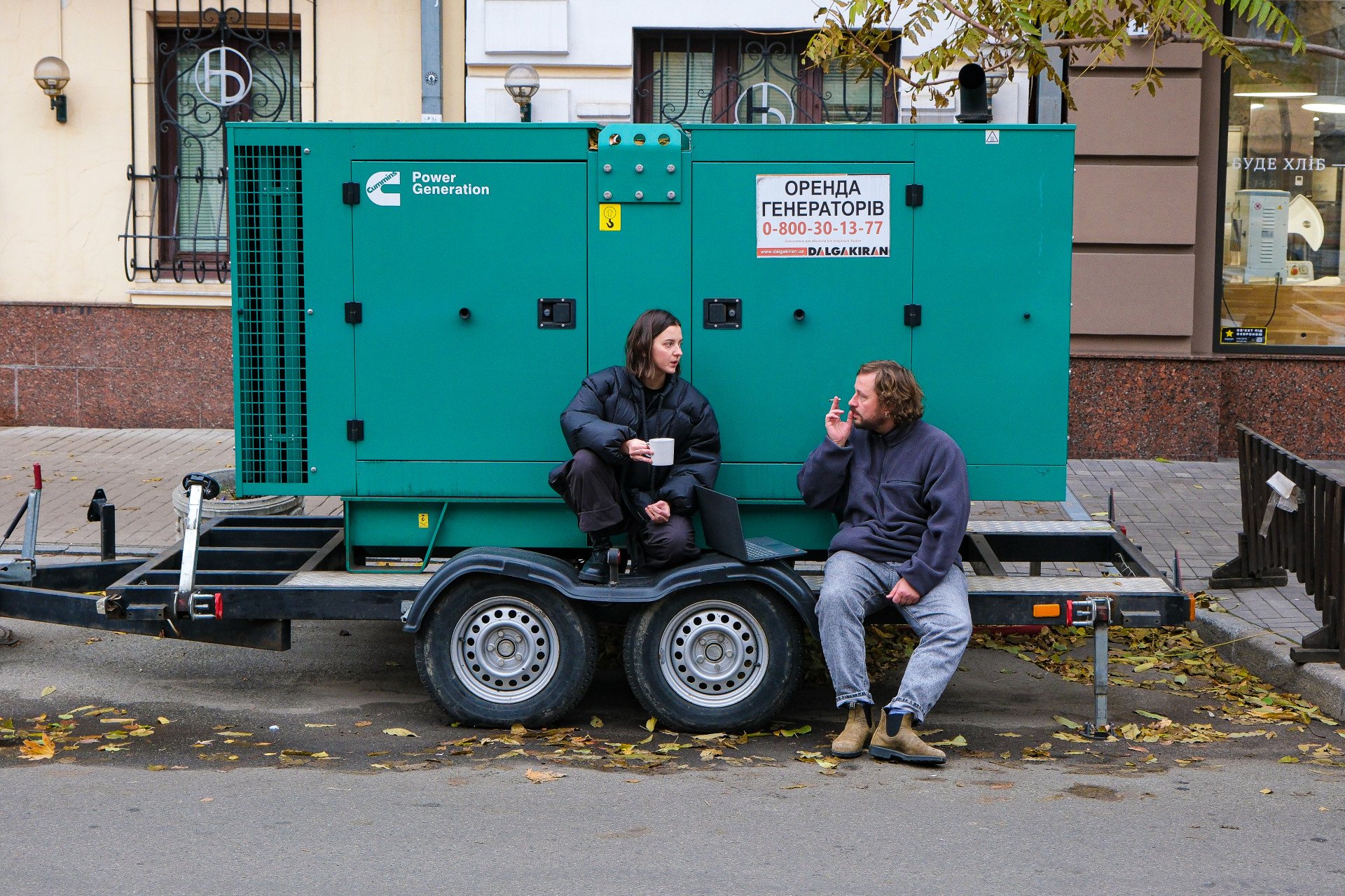
Illia Somin
Illia Somin, the 33-year-old restaurateur behind Spelta and Food Spot in Kyiv has been busy opening new restaurant concepts despite the ongoing war. Illia’s restaurants are beloved spots for pizza, Asian cuisine, and brunch—with arguably the best New York slice in the city. But with the power outages and unstable energy situation in Ukraine, energy is essential to his business, where every penny counts.
“In fact, plugging in the generator is the only thing I did,” Illia explains. “I pay for the rental of the generator even when we don’t use it. Thus, we are always ready for shutdowns.” Though the cost of renting a generator adds up, he notes that it’s a necessary precaution.
“To be honest, there’s not much difference working on a generator or from the mains. If recalculated correctly, the cost per kilowatt is practically the same. The generator rental turns into an insurance payment in case of emergency.”
Keeping everything running smoothly—whether it’s the pizza oven, coffee machine, or the lights—is crucial for keeping customers happy and the bottom line intact.
Illia has noticed some interesting trends among his patrons. “Our regular guests come to us without changes, we are proud of it. I hope they would come even if we had problems with electricity,” he says. But the energy shortages are also drawing in new customers who need more than just a meal.
“When the nearby area has no electricity, and only part of the equipment works—like the coffee machine or one stove—we have all our equipment working without changes. You can still order any dish, pastry, or drink.” Illia said.
This reliability during blackouts has made Illia’s restaurants not just a place to eat, but a refuge for people needing to recharge their devices, connect to Wi-Fi, and experience a bit of normalcy amid the chaos.
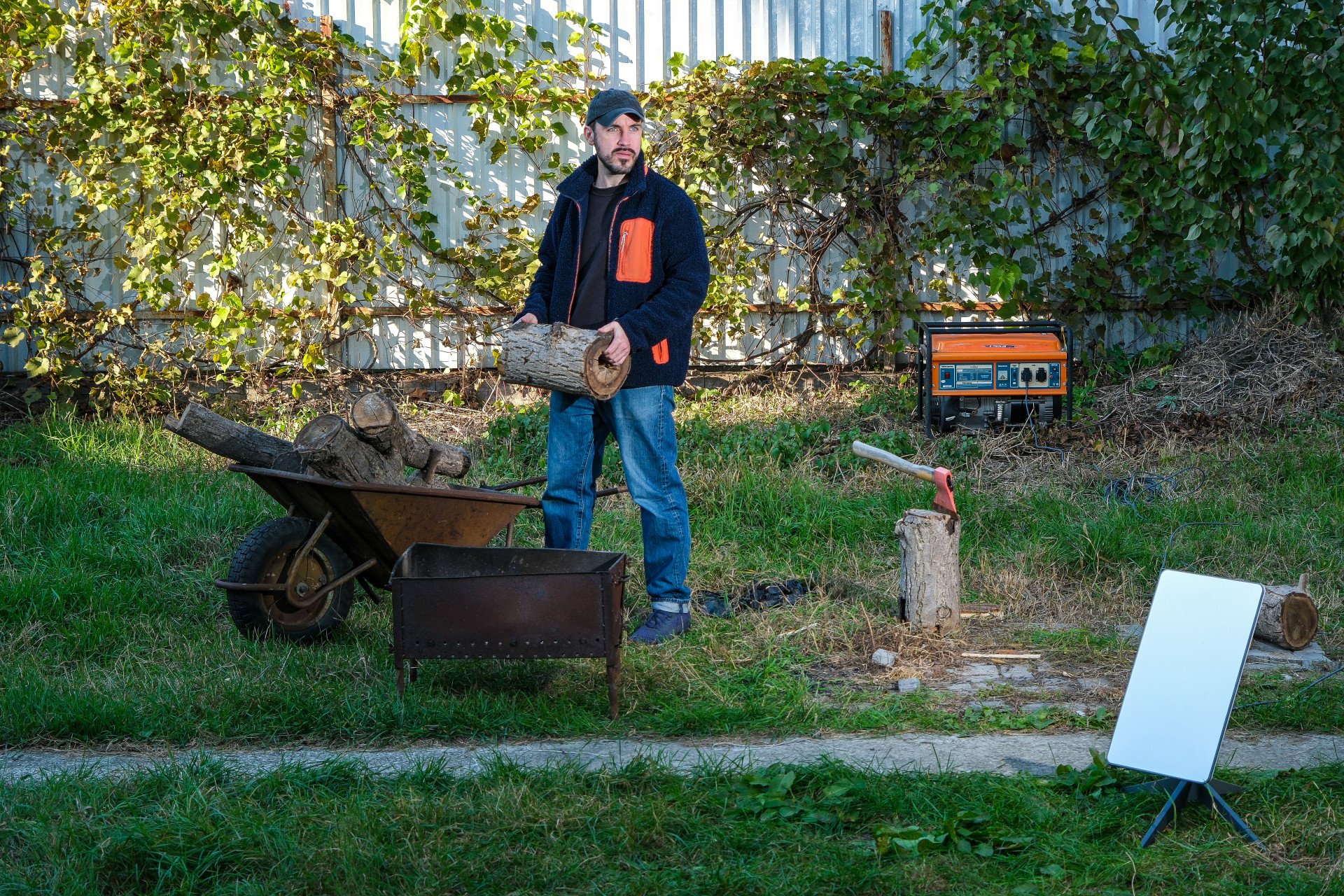
Yaroslav Ogotskyi
Yaroslav Ogotskyi, a 35-year-old Brand Leader, has been preparing for the harsh winters in Ukraine, especially with the ongoing power outages affecting the country. “After the first winter with power outages, I realized that I needed a plan for the most extreme case—if there were no electricity or heating at all. While I can’t influence the situation with outages on a global scale, I can adapt and prepare locally,” Yaroslav says, acknowledging the challenges but emphasizing the importance of personal preparation.
Yaroslav rents a private home with its own well and fiber-optic internet, but he knew that ensuring basic needs like heating and power would be critical. “I equipped the house with a 5.5 kW generator and stocked up on fuel,” he explains. “Additionally, I installed a wood-burning stove to provide heating even during a complete and prolonged power outage.” To stay connected, he also invested in a power station and Elon Musk’s Starlink satellite internet service. “I stocked up on a large supply of wax candles,” he adds, ensuring he’s ready for any situation.
Despite the hardships, Yaroslav finds some positive aspects in these preparations. “A wood-burning stove, combined with candles, creates a wonderful atmosphere for a winter night,” he says, highlighting the charm and warmth that can be found in even the most challenging circumstances.
Looking ahead, Yaroslav is ready for whatever the winter may bring. “Winter is coming, and I’m ready for it,” he concludes, confident in his ability to weather the storm, both literally and figuratively.
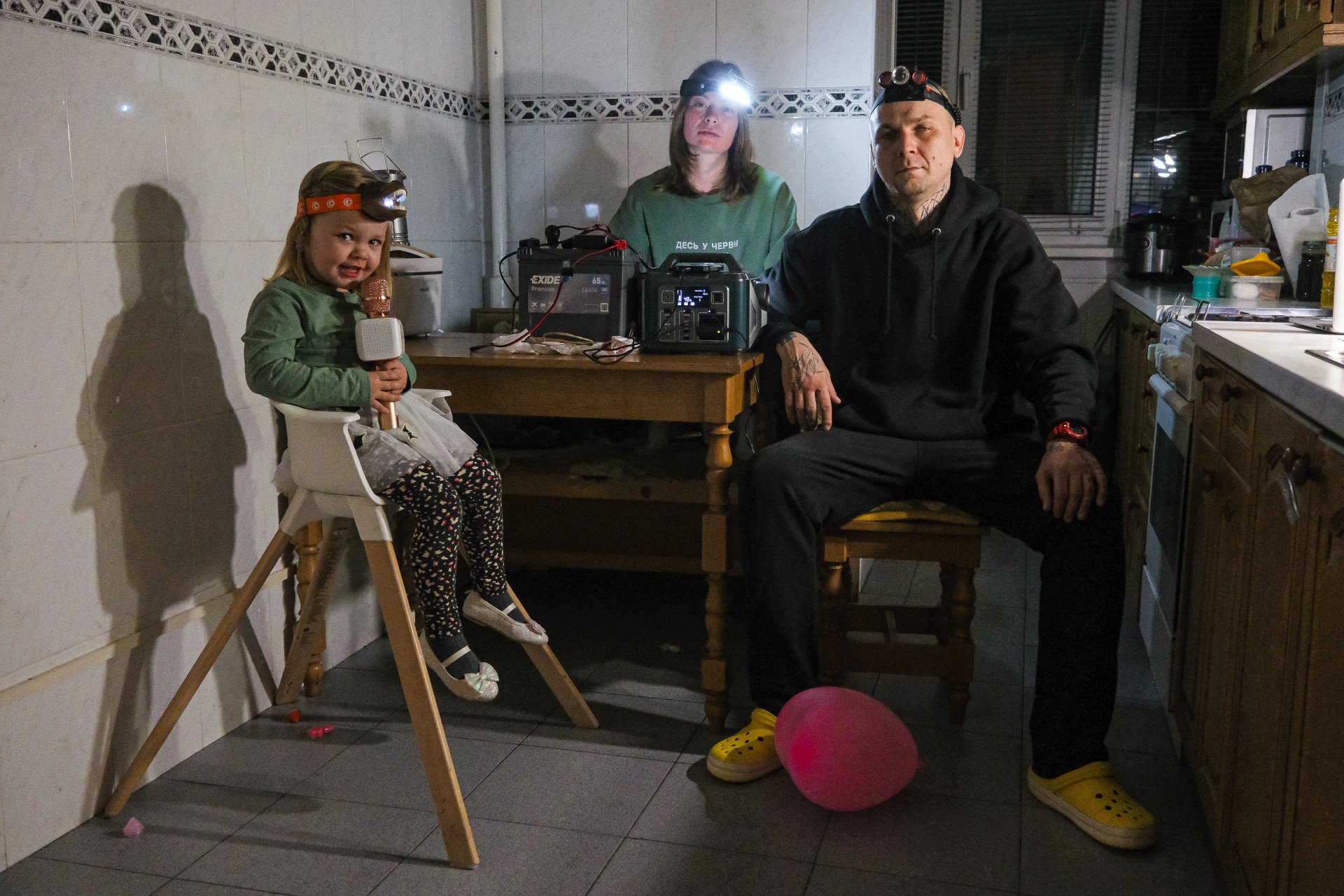
Uliana, Taras, and Maria
Taras Syhydiuk, 33, and his wife Uliana Syhydiuk, 30, are a young couple committed to building their life in Ukraine despite the Russian invasion. “Yes, we plan to build our life in Ukraine, raise our children here, and do not intend to change our location in the future,” Ulliana says, reflecting the pride they feel for their country. Together with their almost 3-year-old daughter, Maria, who is soon to start school, they are determined to make their home a place of stability and love.
“We started preparing for winter in summer,” Uliana explains. “In case of power outages, we are readying our country house: we have a stove to heat both floors, plenty of firewood, and a small generator to cover basic needs.” Taras, who repairs cars, has even found a creative solution for powering their home during outages, using his knowledge of automotive systems.
“There is a special adapter with terminals + and – on one end, and a female socket on the other end for 12V, also known as a car cigarette lighter socket. Into this socket, you can insert a car charging adapter with USB outputs. Some adapters are powerful enough to charge laptops,” Taras explains, showcasing his resourcefulness in adapting car technology to meet his family’s needs.
For Uliana and Taras, family is central to their survival. “During wartime, family is the purpose of fighting for life and a peaceful future, a source of support and motivation. It gives us strength to stay resilient, keeping a clear mind and a compassionate heart. Creating a family allows us to experience life’s fullness and witness the growth and development of a person—it’s beautiful.” Despite the hardships, their determination to stay and make their home secure for Maria is a testament to their love for their country and each other.



-6ead6a9dd508115a5d69759e48e3cad1.jpg)
-29a1a43aba23f9bb779a1ac8b98d2121.jpeg)
-7f50738271c122a9b5e663cb80703dd6.jpg)

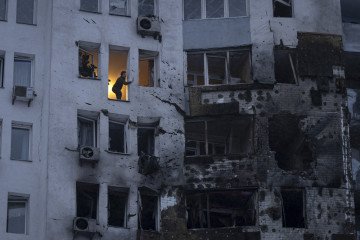
-554f0711f15a880af68b2550a739eee4.jpg)